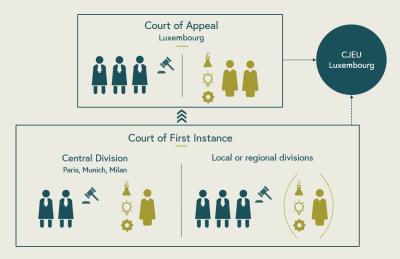Organisation of the UPC
The UPC consists of a Court of First Instance and a Court of Appeal. The Court of First Instance consists of a central division in Paris and a number of local and regional divisions located in the contracting Member States. The Court of Appeal is located in Luxembourg.

The Court of First Instance
The Court of First Instance consists of a central division as well as a number of local divisions and one regional division. Depending on the nature and circumstances of the case, a claimant may bring a case either before the central division or before a competent local or regional division.
Local and regional divisions
Each of the local and regional divisions is competent to review cases within all technological fields. See Where should an action be brought to read more on the jurisdiction of the local and regional divisions.
Not all UPC Member States have established a local or regional division. The Danish Local Division is located in Copenhagen, see The Danish Local Division.
The central division
The central division has its seat in Paris with two other sections located in Munich and Milan (was originally to have been located in London). The section in Paris will, according to the present official legal provisions, hear cases concerning performing operations, transporting, textiles, paper, fixed constructions, physics, and electricity, and the section located in Munich will hear cases concerning mechanical engineering, lighting, heating, weapons, and blasting. Finally, the section in Milan will deal with human necessities and chemistry. It is expected that cases will be reallocated after an initial phase, but a final resolution of this is still outstanding.
The cases before the central division are distributed based on the EPO's patent classification of the patent-in-suit. In this way, it is possible to determine the relevant section of the central division before initiating proceedings before the UPC.
Court of Appeal
The Court of Appeal is seated in Luxembourg.
The Court of Appeal is competent to hear appeals of judgements and rulings from the Court of First Instance. A party may file an appeal if it has been unsuccessful in whole or in part in the first instance case. See How does a case proceed through the UPC system to read more about appeal proceedings.
Composition of the panel of judges
The composition of the panel of judges differs depending on the instance and division as illustrated below.

In the local and regional divisions, the panel of judges is, as a main rule, composed of three legally qualified judges and, if relevant, one technically qualified judge.
In the central division, the panel of judges is composed of two legally qualified judges and one technically qualified judge.
In the Court of Appeal, the panel of judges is composed of three legally qualified judges and two technically qualified judges.
At any stage of the proceedings, the Court of First Instance or the Court of Appeal may request the Court of Justice of the European Union (the "CJEU") to give a preliminary ruling on a question of European Union law, and in some situations they are obliged to do so.
More on UPC |
|---|

|

|

|

|

|

|

|

|
Our team of experts
Do you have any questions on this topic? Don't hesitate to contact Partner Nicolai Lindgreen, Partner Nicolaj Bording, Attorney Emil Petri, Attorney Mathias Rønø Bove or Assistant Attorney Victor Fasmer Henum.

Contact

